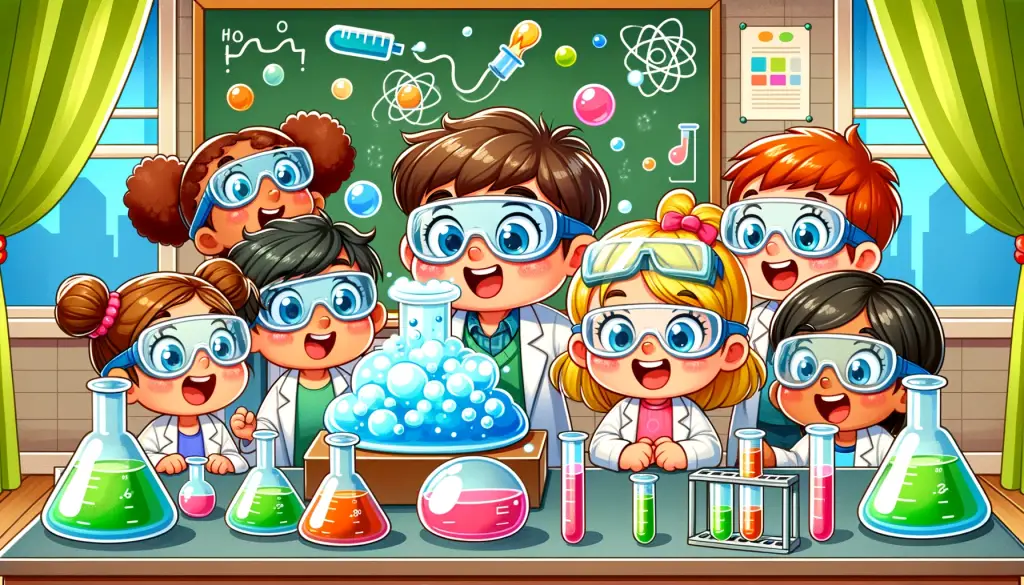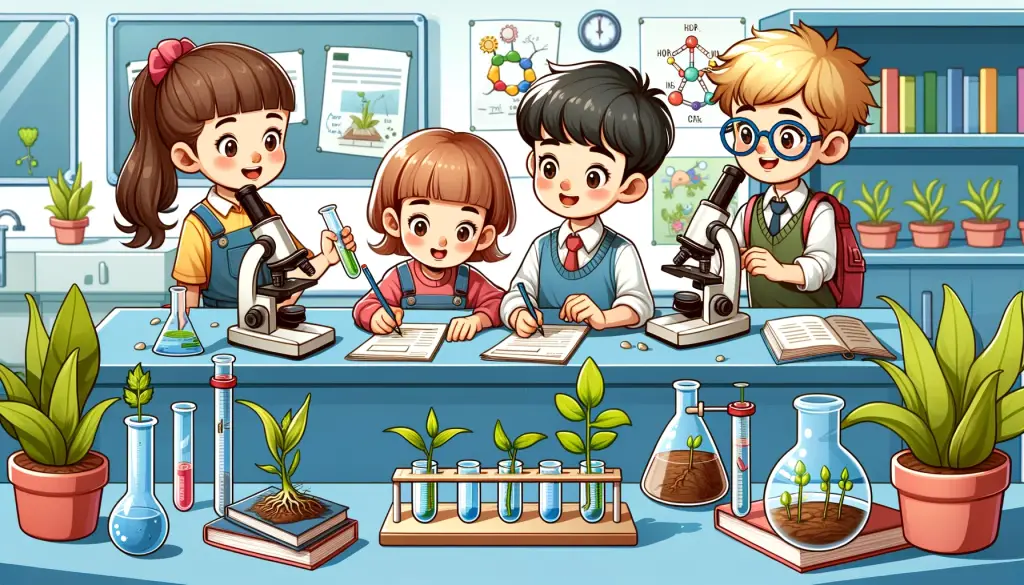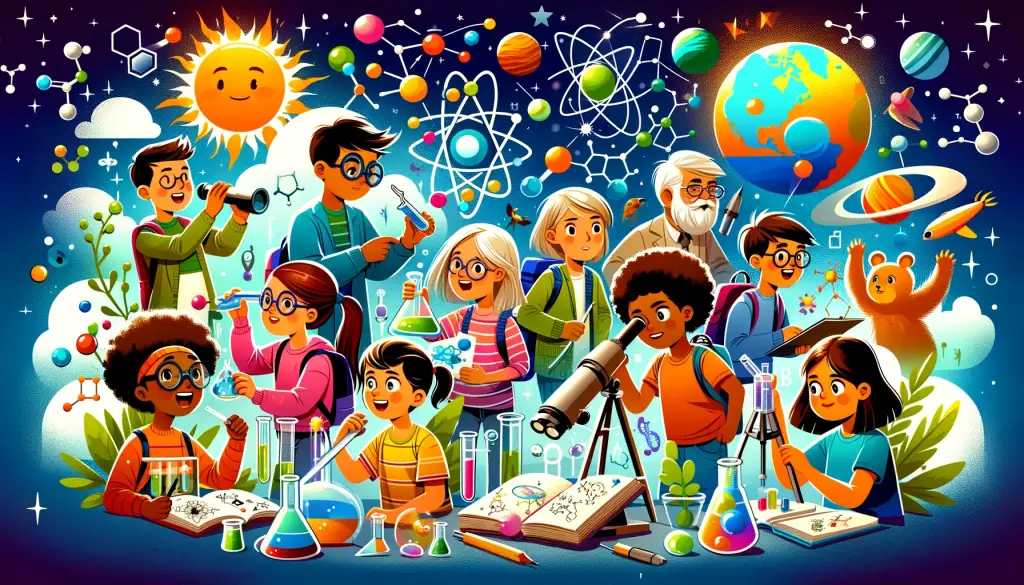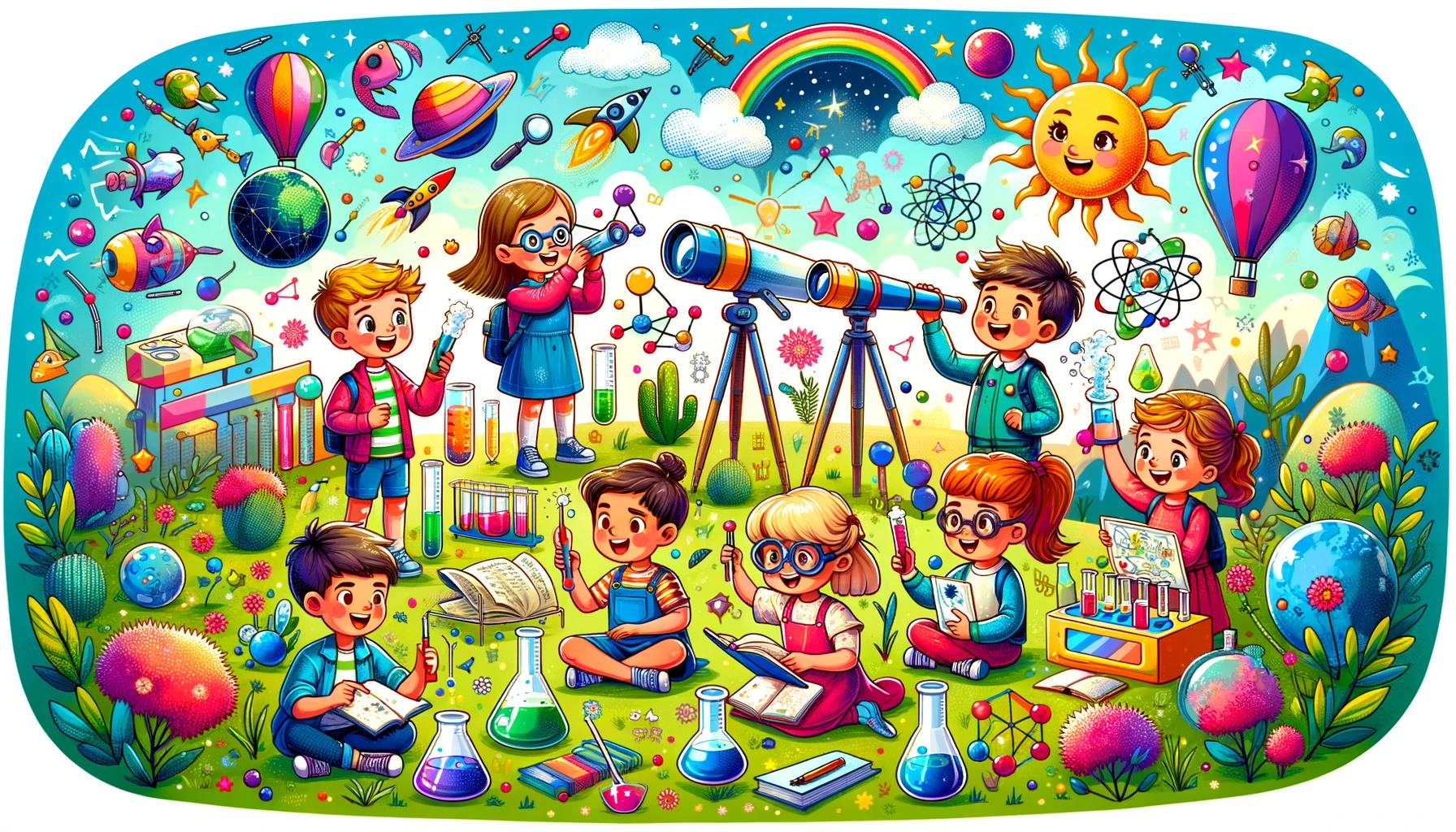Sparking Young Minds with Science!
Science is more than just a subject in school; it’s a doorway to understanding the world around us. From the moment they start exploring their environment, children are natural scientists, curious about everything they see and touch. Engaging kids in science early on is crucial as it lays the groundwork for critical thinking and a lifelong passion for learning. It’s not just about memorizing facts; it’s about nurturing inquisitive minds and encouraging them to ask questions about the world.
Now, imagine combining the wonders of science with the thrill of a trivia game. That’s where science trivia for kids comes in – a delightful blend of fun and learning. Think of it as a treasure hunt, where each question leads to a discovery, a new fact about the world they live in. For children, every correct answer is not just a point scored, but a step towards a greater understanding of the universe.
In this exciting journey, we’ll be diving into a world of fascinating science trivia, tailored for different age groups. Whether it’s understanding the colours of the rainbow for the little ones or unravelling the mysteries of the solar system for the older kids, science trivia is here to make learning a joyous and captivating experience. So, let’s ignite those young minds with the spark of science!

Science Trivia for Ages 3-5: Discovering the World Around
Basic Animal Facts
- Question: What sound does a cow make?
Answer: Moo. - Question: What is the largest land animal?
Answer: Elephant. - Question: Can a kangaroo hop backwards?
Answer: No, kangaroos can only hop forwards. - Question: What animal is known for its long neck?
Answer: Giraffe. - Question: What do bees make?
Answer: Honey. - Question: What animal says “meow”?
Answer: Cat. - Question: How many legs does a spider have?
Answer: Eight. - Question: What is a baby frog called?
Answer: Tadpole. - Question: Do fish breathe underwater?
Answer: Yes, fish breathe underwater. - Question: What color are zebras? Black with white stripes or white with black stripes?
Answer: White with black stripes.
Simple Plant Life
- Question: What do plants need to grow?
Answer: Water, sunlight, and soil. - Question: What part of the plant makes food?
Answer: Leaves. - Question: What color is chlorophyll?
Answer: Green. - Question: What do you call a baby plant?
Answer: Seedling. - Question: Can plants grow on rocks?
Answer: Yes, some plants like moss can. - Question: Do all flowers smell nice?
Answer: No, some flowers do not have a scent. - Question: What is the biggest flower in the world?
Answer: Rafflesia. - Question: What do plants release into the air?
Answer: Oxygen. - Question: Do plants drink water?
Answer: Yes, through their roots. - Question: Can plants grow fruit?
Answer: Yes, many plants grow fruit.
Everyday Science
- Question: What colour is the sky during a sunny day?
Answer: Blue. - Question: Is snow hot or cold?
Answer: Cold. - Question: Do balloons float up or fall down?
Answer: Float up. - Question: What melts in your mouth – ice cream or crackers?
Answer: Ice cream. - Question: Can you see air?
Answer: No, air is invisible. - Question: What do we use to look at stars at night?
Answer: Telescope. - Question: Do shadows need light?
Answer: Yes, shadows are made when light is blocked. - Question: What shape is the Earth?
Answer: Sphere (like a ball). - Question: Is water wet?
Answer: Yes. - Question: Does ice float in water?
Answer: Yes, ice floats in water.
Wonders of the Weather
- Question: What comes down from the sky when it rains?
Answer: Raindrops. - Question: What is snow made of?
Answer: Frozen water. - Question: What shape are most clouds?
Answer: Fluffy and white. - Question: Can you hear thunder?
Answer: Yes, it’s a loud noise during a storm. - Question: What makes a rainbow?
Answer: Sunlight and rain together. - Question: What do we call frozen raindrops?
Answer: Hail. - Question: What season do we build snowmen?
Answer: Winter. - Question: What is the hottest season of the year?
Answer: Summer. - Question: What do we use to protect ourselves from rain?
Answer: An umbrella. - Question: Where does snow go when it gets warm?
Answer: It melts.

Science Trivia for Ages 6-8: Exploring New Frontiers
Basic Human Body
- Question: How many bones does the human body have?
Answer: 206. - Question: What organ helps you breathe?
Answer: Lungs. - Question: Where is your heart located?
Answer: On the left side of your chest. - Question: What part of the body helps you digest food?
Answer: Stomach. - Question: How many senses do humans have?
Answer: Five (sight, smell, taste, touch, hearing). - Question: What makes up half of the human body’s weight?
Answer: Water. - Question: What is the hardest substance in the human body?
Answer: Tooth enamel. - Question: How many types of muscles are in the human body?
Answer: Three types (skeletal, smooth, and cardiac). - Question: What is the largest organ in the human body?
Answer: Skin. - Question: Do humans have a tailbone?
Answer: Yes, it’s called the coccyx.
Elementary Earth Science
- Question: What is the largest ocean on Earth?
Answer: Pacific Ocean. - Question: What causes an earthquake?
Answer: The movement of Earth’s tectonic plates. - Question: How many layers does the Earth have?
Answer: Four main layers (crust, mantle, outer core, inner core). - Question: What is lava?
Answer: Melted rock that comes out of a volcano. - Question: What do we call it when water turns into steam?
Answer: Evaporation. - Question: What natural phenomenon brings rain, thunder, and lightning?
Answer: A thunderstorm. - Question: What is the process by which plants make their food?
Answer: Photosynthesis. - Question: What is the hottest planet in our solar system?
Answer: Venus. - Question: What are the three states of matter?
Answer: Solid, liquid, gas. - Question: Can rocks change their form?
Answer: Yes, through processes like weathering and erosion.
Introduction to the Solar System
- Question: How many planets are in our solar system?
Answer: Eight. - Question: Which planet is known as the Red Planet?
Answer: Mars. - Question: What is the biggest planet in our solar system?
Answer: Jupiter. - Question: What planet is closest to the Sun?
Answer: Mercury. - Question: What planet is famous for its rings?
Answer: Saturn. - Question: What is the name of Earth’s natural satellite?
Answer: The Moon. - Question: Which planet has the Great Red Spot?
Answer: Jupiter. - Question: What is the smallest planet in our solar system?
Answer: Mercury. - Question: What do we call a path that a planet takes around the Sun?
Answer: Orbit. - Question: Is Pluto still considered a planet?
Answer: No, Pluto is classified as a dwarf planet.
Discoveries in Nature
- Question: What is the largest mammal?
Answer: The blue whale. - Question: How do birds fly?
Answer: By flapping their wings. - Question: What is the tallest tree in the world?
Answer: The redwood tree. - Question: Why do leaves change colour in the fall?
Answer: Because of changes in temperature and less sunlight. - Question: What is a habitat?
Answer: A place where animals and plants live. - Question: How does a caterpillar become a butterfly?
Answer: Through a process called metamorphosis. - Question: What causes tides in the ocean?
Answer: The gravitational pull of the moon. - Question: What is a volcano?
Answer: An opening in the Earth’s crust that can erupt lava. - Question: What do we call a scientist who studies plants?
Answer: A botanist. - Question: How do plants get water from the soil?
Answer: Through their roots.
These trivia questions for ages 6-8 are designed to challenge young minds and encourage curiosity about the human body, our Earth, and the fascinating universe beyond. Each question aims to inspire a deeper interest in science, fostering a sense of wonder and exploration in young learners.

Science Trivia for Ages 9-12: Unraveling the Mysteries of Science
Basic Chemistry
- Question: What is the chemical symbol for water?
Answer: H₂O. - Question: What gas do plants need for photosynthesis?
Answer: Carbon Dioxide (CO₂). - Question: What are the three states of matter?
Answer: Solid, liquid, and gas. - Question: What turns litmus paper red?
Answer: Acid. - Question: What is the center of an atom called?
Answer: Nucleus. - Question: What is table salt’s chemical formula?
Answer: NaCl (Sodium Chloride). - Question: What element do all living things need?
Answer: Carbon. - Question: What is the process of boiling water turning into steam called?
Answer: Evaporation. - Question: What is the chemical symbol for gold?
Answer: Au. - Question: What happens in a chemical reaction?
Answer: Substances change into different substances.
Physics Principles
- Question: What force pulls objects towards the Earth?
Answer: Gravity. - Question: What is the speed of light?
Answer: Approximately 299,792 kilometres per second. - Question: What is the unit of measure for force?
Answer: Newton. - Question: What is energy that comes from the sun called?
Answer: Solar energy. - Question: What do we call the movement of heat from one object to another?
Answer: Heat transfer. - Question: What is it called when light bounces off an object?
Answer: Reflection. - Question: What tool measures atmospheric pressure?
Answer: Barometer. - Question: What principle explains why ships float?
Answer: Buoyancy. - Question: What is the opposite of matter?
Answer: Antimatter. - Question: How does sound travel?
Answer: In waves.
More Detailed Space Science
- Question: What galaxy is Earth located in?
Answer: The Milky Way Galaxy. - Question: What is the largest planet in our solar system?
Answer: Jupiter. - Question: What is a supernova?
Answer: The explosion of a star. - Question: What are the small, rocky bodies that orbit the Sun called?
Answer: Asteroids. - Question: What is the term for a year on Mars?
Answer: A Martian year. - Question: What is the name of the force holding us to the Earth?
Answer: Gravity. - Question: What is the brightest star in our night sky
- Question: What is the brightest star in our night sky?
Answer: Sirius. - Question: What do we call a group of stars forming a pattern?
Answer: Constellation. - Question: What is the term for a planet outside our solar system?
Answer: Exoplanet. - Question: What phenomenon causes a “shooting star”?
Answer: A meteor entering the Earth’s atmosphere and burning up.
Innovations in Technology
- Question: What was the first man-made object to land on the moon?
Answer: The Apollo Lunar Module. - Question: What is the Internet?
Answer: A global network of computers. - Question: Who invented the light bulb?
Answer: Thomas Edison. - Question: What is robotics?
Answer: The study of robots. - Question: How does a compass work?
Answer: It uses the Earth’s magnetic field to show direction. - Question: What energy source does not pollute the air?
Answer: Solar energy. - Question: What is DNA?
Answer: The material that carries genetic information in living things. - Question: Who was the first person in space?
Answer: Yuri Gagarin. - Question: What is artificial intelligence?
Answer: Machines that can perform tasks that typically require human intelligence. - Question: Who patented the first practical telephone?
Answer: Alexander Graham Bell.
These trivia questions are designed to challenge and engage upper primary school children in the realms of chemistry, physics, and space science. Each question aims to deepen their understanding of scientific concepts and inspire a sense of wonder about the world and the universe beyond.
Interactive Science Trivia Activities: Making Learning Fun
Turning Trivia into a Game
- Science Trivia Board Game: Create a board game where kids move pieces based on correct answers. Use different colour spaces for different science topics.
- Quiz Show: Set up a mock game show at home, where children buzz in to answer questions. This not only makes it fun but also helps with quick thinking.
- Science Treasure Hunt: Combine trivia questions with a treasure hunt. Each correct answer leads to a clue for the next location.
- Flashcard Challenge: Make flashcards with questions on one side and answers on the other. Use these for quick-fire rounds, challenging kids to answer as many as possible in a set time.
- Science Bingo: Create bingo cards with science facts instead of numbers. Call out questions, and if the child has the answer on their card, they get to mark it.
Tips for Engaging Children in Science
- Relate to Everyday Life: Connect trivia questions to everyday phenomena. For example, asking about rain while it’s raining outside makes the learning experience more relevant.
- Incorporate Experiments: After answering a trivia question, try a simple experiment to demonstrate the concept. For instance, after a question about states of matter, you could melt ice to show the transition from solid to liquid.
- Use Technology: There are many apps and online platforms for interactive science quizzes. These can be a fun and modern way to engage children.
- Encourage Questions: After a trivia session, ask kids if they have any questions. This encourages them to think critically and seek more knowledge.
- Reward Curiosity: Praise and small rewards for correct answers can motivate children. The reward doesn’t have to be material; it can be as simple as choosing the next game or leading the next trivia session.
- Family Science Night: Make science trivia a family event. This not only makes learning fun but also strengthens family bonds.
- Field Trips: Visit science museums, planetariums, or nature parks. Afterwards, quiz your kids about what they learned during the outing.
These activities and tips are designed to make science trivia an engaging and interactive experience for children. By turning learning into a game and connecting it to the world around them, parents can foster a love of science in their kids that goes beyond the classroom.
Check Out These Articles For More Trivia
Concluding Science Trivia Questions For Kids
As we wrap up our exploration of science trivia for kids, it’s clear that these fun and engaging questions do more than just entertain. They serve as a powerful tool to ignite a child’s curiosity and expand their knowledge of the world. Through trivia, children learn to think critically, ask questions, and develop a keen interest in understanding the how and why of things around them.
The beauty of science trivia lies in its ability to turn learning into an adventure. Each question answered opens up new horizons for exploration and discovery, encouraging children to delve deeper into the fascinating realms of science. This approach to learning fosters not just academic knowledge but also a sense of wonder and a lifelong passion for science.
Let’s keep the spirit of inquiry alive in our children. Encourage them to ask more, learn more, and explore more. The journey into the world of science is endless and filled with wonders at every turn. By fostering a love for science through fun and interactive trivia, we are setting our children on a path of continuous learning and discovery, preparing them to become the thinkers and innovators of tomorrow.

